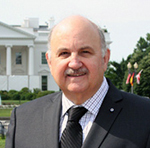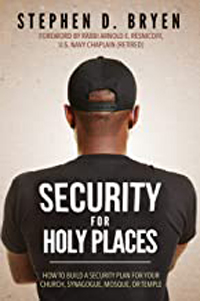
 WASHINGTON, D.C. — A new security approach is needed to protect holy places. Even before the COVID-19 epidemic and the lockdown that impacted businesses and organizations, especially churches, synagogues, mosques and temples, attacks on holy places were increasing. Now almost every day another religious site is invaded, trashed, burned or rabbis, priests, ministers, pastors and monks are assaulted, and in one case a Buddhist monk was killed praying in his temple by a gunshot in High Point, North Carolina.
WASHINGTON, D.C. — A new security approach is needed to protect holy places. Even before the COVID-19 epidemic and the lockdown that impacted businesses and organizations, especially churches, synagogues, mosques and temples, attacks on holy places were increasing. Now almost every day another religious site is invaded, trashed, burned or rabbis, priests, ministers, pastors and monks are assaulted, and in one case a Buddhist monk was killed praying in his temple by a gunshot in High Point, North Carolina.
Two things happened since the COVID-19 lockdowns happened.
Firstly, holy places were closed and mostly left unprotected. This created a field day for burglars to break in and steal valuable artifacts, many made of silver and gold, and to run off with books, electronics and other goods.
Secondly, it opened the door to radicals –both on the right and left, groups like ANTIFA and neoNazis, to take advantage of empty churches, synagogues and mosques to burn them, destroy crosses and statues, rip up Torahs and spray paint walls, smash windows and just about everything else.
It is heartbreaking to see religious symbols trashed, burned or wrecked. Even cemeteries are not spared. In the United States, and in Europe (particularly in Germany and France) tombstones are overturned or Nazi symbols and hate messages are painted on grave markers.
Churches are being torched and some are burning to the ground. In California the 249 year-old San Gabriel Mission was mostly destroyed by fire on July 11th. Back in May, the Orange County Fire Authority (OCFA) reported that investigators determined that a May 7th blaze at the former United Presbyterian Church was intentionally sparked. The church burned to the ground.
In France most recently, the Nantes Church of St. Peter and Paul was torched by three intentionally lit fires inside the structure. An historic pipe organ and a beautiful ancient stained glass window were lost, and considerable damage was done to the sanctuary.
In Richmond, Virginia at Congregation Beth Ahabah, a more than 200-year-old Reform congregation, video captured a “protestor” throwing bricks through the synagogues windows. Dozens of synagogues have been vandalized, windows smashed, artifacts stolen or descrated and antisemitic grafiti smeared on the inside of sanctuaries as well as on the outside.
No one has been spared –neither mosques, temples, Catholic Churches, Protestant Churches, Evangelical Christian Churches.
Limited Budgets
COVID-19 also created a perfect storm for holy place budgets; even more of a crisis where the house of prayer is tied to a school which also has had to close down. Even before the epidemic, many churches, synagogues and mosques were having trouble paying their bills. But with congregants not attending services, many out of work, keeping up with even routine maintenance has been a serious problem. Few can afford full time guards or other security personnel.
US Government Program
The US government, through the Department of Homeland Security, has a “Non-Profit Security Grant Program” that offers $50 Million for eligible nonprofit entities that are within designated urban areas and $40 Million for eligible nonprofit entities that are not within designated urban areas. Typical grants can range up to $100,000 per annual application and can be used to buy security equipment and make physical improvements such as lighting and physical barriers to improve security.
Like any other government program, getting an award takes some effort and everything requested needs to be backed up with careful analysis and pricing information. But even after an award is granted, it takes many months, upwards to a year, to get DHS to sign off on paying for the improvements.
In a time of viral assaults, rising antisemitism, attacks on all kinds of religious institutions, waiting nearly a year to get help isn’t really help at all when it is needed.
In 2020, for the first time, grants can pay for security guards. Before that, paying for services was not allowed. In today’s security environment, security guards, especially at night, are vital to protecting holy places.
A Proposal
Instead of pushing an expensive and unwieldy security grant program, it would make far better sense for the Federal government to make smaller awards to get security guards on the job in as many locations as possible. Just by making grants for $25,000 instead of $100,000 and restricting the grants to hiring security guards, would be a powerful deterrent to crime against holy places.
The DHS program to help out faith based institutions is very important, and it comes straight out of the DHS discretionary budget, not from an explicit Congressional mandate. Kudos to DHS and the Federal Emergency Management Agency that administers the program. But praising the program does not mean it currently fits the real need in the crisis we are in. It is time to formulate a new approach so that there is a practical deterrent to hate crime against religious organizations.
*
Stephen D. Bryen, Ph.D, is an internationally recognized security expert. He is the author of the new book: Security for Holy Places: How to Build a Security Plan for your Church, Synagogues, Mosque or Temple. The book is published by Morgan James.